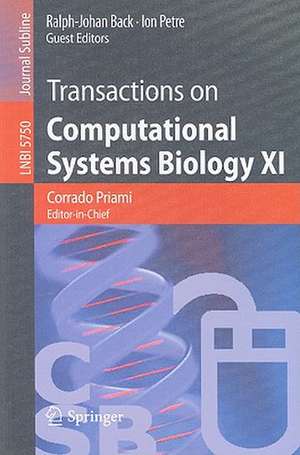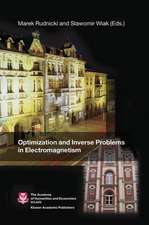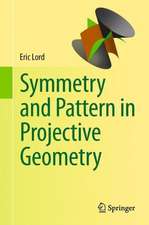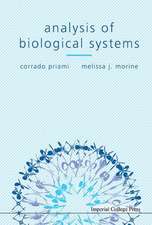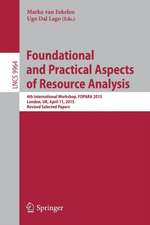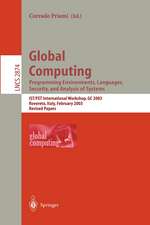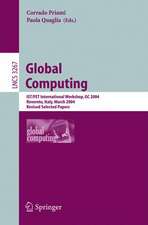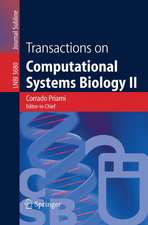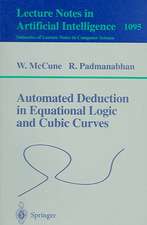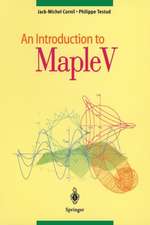Transactions on Computational Systems Biology XI: Computational Models for Cell Processes: Lecture Notes in Computer Science, cartea 5750
Editat de Corrado Priami Ralph-Johan Back, Ion Petreen Limba Engleză Paperback – 7 sep 2009
Din seria Lecture Notes in Computer Science
- 20%
 Preț: 1061.55 lei
Preț: 1061.55 lei - 20%
 Preț: 307.71 lei
Preț: 307.71 lei - 20%
 Preț: 438.69 lei
Preț: 438.69 lei - 20%
 Preț: 645.28 lei
Preț: 645.28 lei -
 Preț: 410.88 lei
Preț: 410.88 lei - 15%
 Preț: 580.46 lei
Preț: 580.46 lei - 17%
 Preț: 427.22 lei
Preț: 427.22 lei - 20%
 Preț: 596.46 lei
Preț: 596.46 lei -
 Preț: 449.57 lei
Preț: 449.57 lei - 20%
 Preț: 353.50 lei
Preț: 353.50 lei - 20%
 Preț: 1414.79 lei
Preț: 1414.79 lei - 20%
 Preț: 309.90 lei
Preț: 309.90 lei - 20%
 Preț: 583.40 lei
Preț: 583.40 lei - 20%
 Preț: 1075.26 lei
Preț: 1075.26 lei - 20%
 Preț: 310.26 lei
Preț: 310.26 lei - 20%
 Preț: 655.02 lei
Preț: 655.02 lei - 20%
 Preț: 580.93 lei
Preț: 580.93 lei - 20%
 Preț: 340.32 lei
Preț: 340.32 lei - 18%
 Preț: 938.83 lei
Preț: 938.83 lei - 20%
 Preț: 591.51 lei
Preț: 591.51 lei - 15%
 Preț: 438.59 lei
Preț: 438.59 lei - 20%
 Preț: 337.00 lei
Preț: 337.00 lei -
 Preț: 389.48 lei
Preț: 389.48 lei - 20%
 Preț: 607.39 lei
Preț: 607.39 lei - 20%
 Preț: 1024.44 lei
Preț: 1024.44 lei - 20%
 Preț: 579.30 lei
Preț: 579.30 lei - 20%
 Preț: 763.23 lei
Preț: 763.23 lei - 20%
 Preț: 453.32 lei
Preț: 453.32 lei - 20%
 Preț: 575.48 lei
Preț: 575.48 lei - 20%
 Preț: 585.88 lei
Preț: 585.88 lei - 20%
 Preț: 825.93 lei
Preț: 825.93 lei - 20%
 Preț: 763.23 lei
Preț: 763.23 lei - 17%
 Preț: 360.19 lei
Preț: 360.19 lei - 20%
 Preț: 1183.14 lei
Preț: 1183.14 lei - 20%
 Preț: 340.32 lei
Preț: 340.32 lei - 20%
 Preț: 504.57 lei
Preț: 504.57 lei - 20%
 Preț: 369.12 lei
Preț: 369.12 lei - 20%
 Preț: 583.40 lei
Preț: 583.40 lei - 20%
 Preț: 343.62 lei
Preț: 343.62 lei - 20%
 Preț: 350.21 lei
Preț: 350.21 lei - 20%
 Preț: 764.89 lei
Preț: 764.89 lei - 20%
 Preț: 583.40 lei
Preț: 583.40 lei - 20%
 Preț: 649.49 lei
Preț: 649.49 lei - 20%
 Preț: 341.95 lei
Preț: 341.95 lei - 20%
 Preț: 238.01 lei
Preț: 238.01 lei - 20%
 Preț: 538.29 lei
Preț: 538.29 lei
Preț: 393.52 lei
Nou
Puncte Express: 590
Preț estimativ în valută:
75.30€ • 78.83$ • 62.31£
75.30€ • 78.83$ • 62.31£
Carte tipărită la comandă
Livrare economică 07-21 aprilie
Preluare comenzi: 021 569.72.76
Specificații
ISBN-13: 9783642041853
ISBN-10: 364204185X
Pagini: 335
Ilustrații: VIII, 335 p.
Dimensiuni: 155 x 235 x 25 mm
Greutate: 0.54 kg
Ediția:2009
Editura: Springer Berlin, Heidelberg
Colecția Springer
Seriile Lecture Notes in Computer Science, Transactions on Computational Systems Biology
Locul publicării:Berlin, Heidelberg, Germany
ISBN-10: 364204185X
Pagini: 335
Ilustrații: VIII, 335 p.
Dimensiuni: 155 x 235 x 25 mm
Greutate: 0.54 kg
Ediția:2009
Editura: Springer Berlin, Heidelberg
Colecția Springer
Seriile Lecture Notes in Computer Science, Transactions on Computational Systems Biology
Locul publicării:Berlin, Heidelberg, Germany
Public țintă
ResearchCuprins
Computational Models for Cell Processes.- Process Algebra Modelling Styles for Biomolecular Processes.- Simple, Enhanced and Mutual Mobile Membranes.- Bio-PEPA with Events.- In Silico Modelling and Analysis of Ribosome Kinetics and aa-tRNA Competition.- Qualitative and Quantitative Analysis of a Bio-PEPA Model of the Gp130/JAK/STAT Signalling Pathway.- Rule-Based Modelling and Model Perturbation.- Extended Stochastic Petri Nets for Model-Based Design of Wetlab Experiments.- A Projective Brane Calculus with Activate, Bud and Mate as Primitive Actions.- Accepting Networks of Non-inserting Evolutionary Processors.- Discrete Modeling of Biochemical Signaling with Memory Enhancement.- Dynamical Systems and Stochastic Programming: To Ordinary Differential Equations and Back.- Computing Equilibrium Points of Genetic Regulatory Networks.- Code, Context, and Epigenetic Catalysis in Gene Expression.
Recenzii
From the reviews:
“It is a multidisciplinary collection of research papers, by researchers, for researchers. The papers target specialists in particular formalisms. … papers were presented at a satellite workshop of the 15th International Symposium on Formal Methods at Turku, in 2008. The goal of the research is to supplement ‘wetlab’ science (in vitro or in vivo) by in silico or in numero studies. … In conclusion, this book is for specialists … .” (Richard Botting, ACM Computing Reviews, November, 2010)
“It is a multidisciplinary collection of research papers, by researchers, for researchers. The papers target specialists in particular formalisms. … papers were presented at a satellite workshop of the 15th International Symposium on Formal Methods at Turku, in 2008. The goal of the research is to supplement ‘wetlab’ science (in vitro or in vivo) by in silico or in numero studies. … In conclusion, this book is for specialists … .” (Richard Botting, ACM Computing Reviews, November, 2010)
Textul de pe ultima copertă
The LNCS journal Transactions on Computational Systems Biology is devoted to inter- and multidisciplinary research in the fields of computer science and life sciences and supports a paradigmatic shift in the techniques from computer and information science to cope with the new challenges arising from the systems oriented point of view of biological phenomena.
This special issue on Computational Models for Cell Processes is based on a workshop with the same name that took place in Turku, Finland, on May 27, 2008. The accepted papers, which have passed through a separate peer-review process, span an interesting mix of approaches to systems biology, ranging from quantitative to qualitative techniques, from continuous to discrete mathematics, from deterministic to stochastic methods, and from computational models for biology to computing paradigms inspired by biology. Also included in this issue are three regular submissions dealing with the relationship between ODEs and stochastic concurrent constraint programming, with the equilibrium points of genetic regulatory networks, and with probability models describing how epigenetic context affects gene expression and organismal development.
This special issue on Computational Models for Cell Processes is based on a workshop with the same name that took place in Turku, Finland, on May 27, 2008. The accepted papers, which have passed through a separate peer-review process, span an interesting mix of approaches to systems biology, ranging from quantitative to qualitative techniques, from continuous to discrete mathematics, from deterministic to stochastic methods, and from computational models for biology to computing paradigms inspired by biology. Also included in this issue are three regular submissions dealing with the relationship between ODEs and stochastic concurrent constraint programming, with the equilibrium points of genetic regulatory networks, and with probability models describing how epigenetic context affects gene expression and organismal development.
